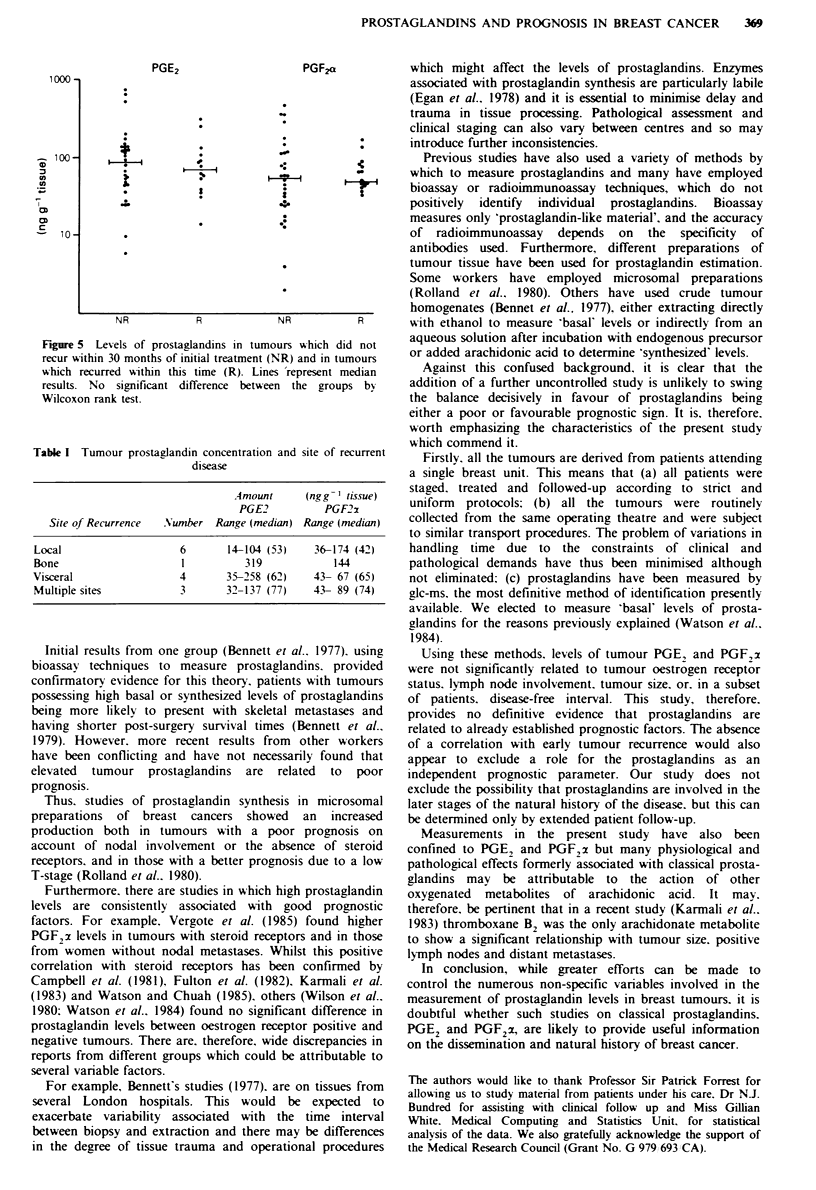Abstract
Prostaglandins E2 and F2 alpha (PGE2 and PGF2 alpha) were measured by gas liquid chromatography--mass spectrometry (glc-ms) in extracts of primary tumours from 78 patients with early breast cancer. These levels have been related to factors of established prognostic value and the patients disease-free interval. Although there was a wide variation in amounts of both prostaglandins extracted from different tumours, no significant relationship was observed between levels of prostaglandins and oestrogen receptors (ER), tumour size, presence of lymph node involvement and disease-free interval following primary treatment. It therefore seems unlikely that the level of these particular prostaglandins within breast carcinomas plays a fundamental role in the prognosis of the disease.
Full text
PDF



Selected References
These references are in PubMed. This may not be the complete list of references from this article.
- Bennett A., Charlier E. M., McDonald A. M., Simpson J. S., Stamford I. F., Zebro T. Prostaglandins and breast cancer. Lancet. 1977 Sep 24;2(8039):624–626. doi: 10.1016/s0140-6736(77)92496-5. [DOI] [PubMed] [Google Scholar]
- Egan R. W., Paxton J., Kuehl F. A., Jr Mechanism for irreversible self-deactivation of prostaglandin synthetase. J Biol Chem. 1976 Dec 10;251(23):7329–7335. [PubMed] [Google Scholar]
- Hawkins R. A., Hill A., Freedman B. A simple method for the determination of oestrogen receptor concentrations in breast tumours and other tissues. Clin Chim Acta. 1975 Oct 15;64(2):203–210. doi: 10.1016/0009-8981(75)90202-8. [DOI] [PubMed] [Google Scholar]
- Karmali R. A., Welt S., Thaler H. T., Lefevre F. Prostaglandins in breast cancer: relationship to disease stage and hormone status. Br J Cancer. 1983 Nov;48(5):689–696. doi: 10.1038/bjc.1983.251. [DOI] [PMC free article] [PubMed] [Google Scholar]
- Klein D. C., Raisz L. G. Prostaglandins: stimulation of bone resorption in tissue culture. Endocrinology. 1970 Jun;86(6):1436–1440. doi: 10.1210/endo-86-6-1436. [DOI] [PubMed] [Google Scholar]
- Rolland P. H., Martin P. M., Jacquemier J., Rolland A. M., Toga M. Prostaglandin in human breast cancer: Evidence suggesting that an elevated prostaglandin production is a marker of high metastatic potential for neoplastic cells. J Natl Cancer Inst. 1980 May;64(5):1061–1070. [PubMed] [Google Scholar]
- Vergote I. B., Laekeman G. M., Keersmaekers G. H., Uyttenbroeck F. L., Vanderheyden J. S., Albertyn G. P., Haensch C. F., De Roy G. J., Herman A. G. Prostaglandin F2 alpha in benign and malignant breast tumours. Br J Cancer. 1985 Jun;51(6):827–836. doi: 10.1038/bjc.1985.128. [DOI] [PMC free article] [PubMed] [Google Scholar]
- Watson D. M., Kelly R. W., Hawkins R. A., Miller W. R. Prostaglandins in human mammary cancer. Br J Cancer. 1984 Apr;49(4):459–464. doi: 10.1038/bjc.1984.73. [DOI] [PMC free article] [PubMed] [Google Scholar]
- Watson J., Chuah S. Y. Prostaglandins, steroids and human mammary cancer. Eur J Cancer Clin Oncol. 1985 Sep;21(9):1051–1055. doi: 10.1016/0277-5379(85)90290-1. [DOI] [PubMed] [Google Scholar]



